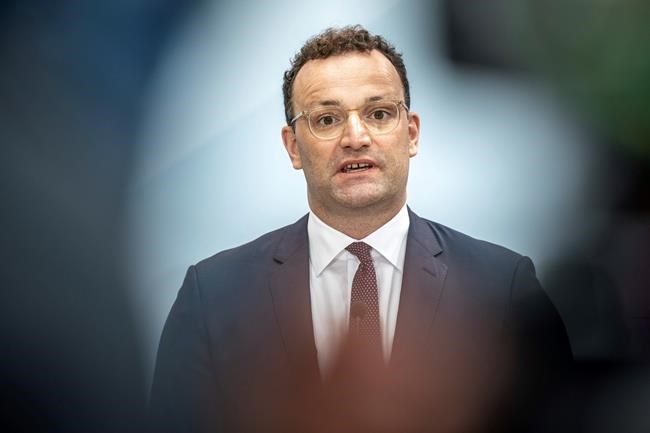
Jens Spahn, federal minister of health, gives a press conference at the Federal Ministry of Health in Berlin, Germany, Wednesday, Aug. 26, 2020. Due to increasing exposure to corona tests, laboratories in Germany demanded new regulations for tests for people returning to Germany as soon as possible. Spahn and the health ministers of the states had suggested by a majority that free corona tests for holidaymakers should no longer be available in the future. (Michael Kappeler/dpa via AP)
Republished August 26, 2020 - 6:19 AM
Original Publication Date August 26, 2020 - 2:36 AM
BERLIN - Germany will end mandatory coronavirus tests for travellers returning from high-risk areas abroad and again focus its testing strategy on people with symptoms or possible exposure to COVID-19 patients, the country's health minister said Wednesday.
Health Minister Jens Spahn said that over the summer vacation period the number of virus tests performed in Germany nearly doubled, to 900,000 per week, in part to identify people who caught the virus during trips abroad.
People coming home from coronavirus risk areas were offered free tests at airports, train stations and highway stops, allowing them to cut short the required two-week quarantine if their result came back negative.
Travellers returning from high-risk areas, which include most countries outside the European Union and some regions inside the bloc, will in the future be required to go into mandatory quarantines for at least five days before taking a test, which may no longer be free unless ordered by a doctor.
“With the end of the vacation period ... this risk is going down again,” Spahn told reporters in Berlin. “We have to focus more on patients with symptoms and those who had contact with COVID patients.”
Spahn did not say when exactly the testing strategy would change, but it is likely that that decision will be made at a meeting on Thursday between Chancellor Angela Merkel and the country’s 16 state governors.
The change in the country’s testing strategy is also due to Germany’s labs reaching the limits of their capacities, Spahn said.
The operators of Frankfurt Airport, Germany’s biggest, criticized the decision to focus on quarantining, rather than testing travellers.
Stefan Schulte, the chief executive of Fraport, said the move amounted to a second lockdown for the airline and travel industries. He called on the government to instead improve the existing system of testing travellers from high-risk areas rather than to dismantled it again.
On Wednesday, Germany’s disease control centre reported 1,576 new confirmed coronavirus cases. Since the beginning of the pandemic, the country has reported 236,429 cases and 9,280 virus-related deaths. The average age of infected individuals has declined to 32 from around age 50 at the beginning of the pandemic.
More younger people becoming infected means that fewer COVID-19 patients ended up hospitalized, but “we want to avoid that (the virus) will reach those groups that are especially vulnerable,” Spahn said.
Late Tuesday, the parties in Germany's governing coalition agreed to extend short-work measures introduced due to the pandemic until the end of next year, with the government supporting companies using the strategy to avoid layoffs with around 10 billion euros ($11.8 billion) in tax money.
In further developments, organizers cancelled plans for a large concert with Bryan Adams in Duesseldorf on Sept. 4, while in Berlin authorities banned several protests planned for the weekend against coronavirus pandemic measures.
Officials said that those protesting would likely have breached rules on social distancing designed to stop the spread of the virus. Germany has seen an upswing in new confirmed cases in recent weeks, and the government is considering whether to impose fresh restrictions again.
Authorities in the capital cited a rally against COVID-19 restrictions on Aug. 1 during which participants ignored mask-wearing and distancing rules and other conditions imposed on the protest.
Berlin’s top security official, Andreas Geisel, welcomed the decision.
“We need to weigh the basic right of freedom of assembly against the sanctity of life,” he said. “We chose life.”
Geisel said police would act to stop any large gathering of people and indicated that authorities wouldn’t tolerate a tent camp that protesters have erected near the German parliament.
“I’m not prepared to accept that Berlin is abused a second time as a stage for corona deniers ... and right-wing extremists,” he said.
Numerous leading figures in the country’s far-right scene, including members of the Alternative for Germany party, had announced they would participate in rallies in Berlin on Saturday.
The party’s leader in the Berlin state assembly, Georg Pazderski, criticized the decision to ban the protests, calling it disproportionate and unjustified.
The organizer of one of the protests has said they will appeal the ban.
News from © The Associated Press, 2020